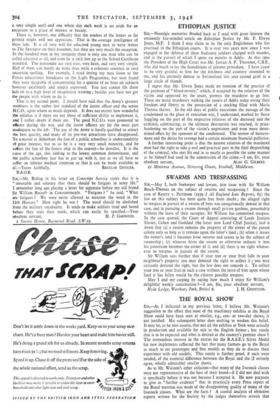SWARMS AND TRESPASSING
Sia,—May I, both beekeeper and lawyer, join issue with Sir William Beach-Thomas on the subject of swarms and trespassing ? Since the case of Kearry v. Pattinson (1939 I All England Law Reports, 65) the law on this s'ubject has been quite free from doubt ; the alleged right to trespass in pursuit of a swarm of bees was unequivocally denied in' that case, and in pursuing a swarm through small private gardens, presumably without the leave of their occupier, Sir William has committed trespass. In the case quoted, the Court of Appeal consisting of Lords Justices Slesser, Cohen and Goddard (the latter now Lord Chief Justice), laid it down that (a) a swarm remains the property of the owner of the parent colony only so long as it remains upon the latter's land ; (b) when it leaves the owner's land it becomes ferae naturae and ceases to be the subject of ownership ; (c) whoever hives the swarm or otherwise reduces it into his possession becomes the owner of it, and (d) there is no right whatso- ever to trespass in pursuit of the swarm.
Sir William says further that if your tree or your fruit falls in your neighbour's property you may demand the right to collect it ; you may certainly demand the right, but the law does not concede it. To collect your tree or your fruit in such a case without the leave of him upon whose land it has fallen would be the clearest possible trespass.
May I end my carping by saying how much I enjoy Sir William's delightful weekly contribution ?—I am, Sir, your obedient servant,
Hyde Lodge, Westbury Park, Bristol 6. J. H. GIUFFITHS.


































 Previous page
Previous page